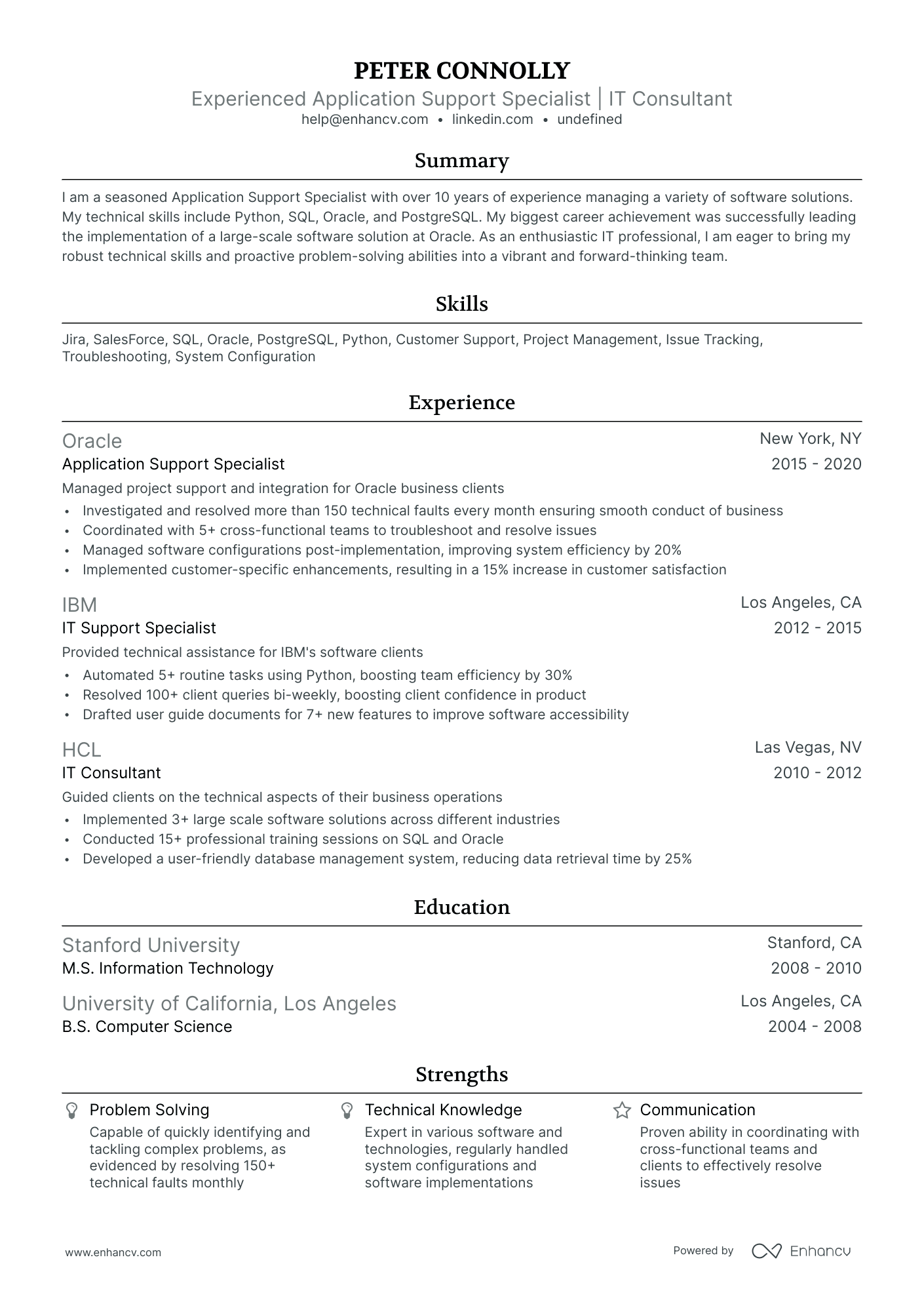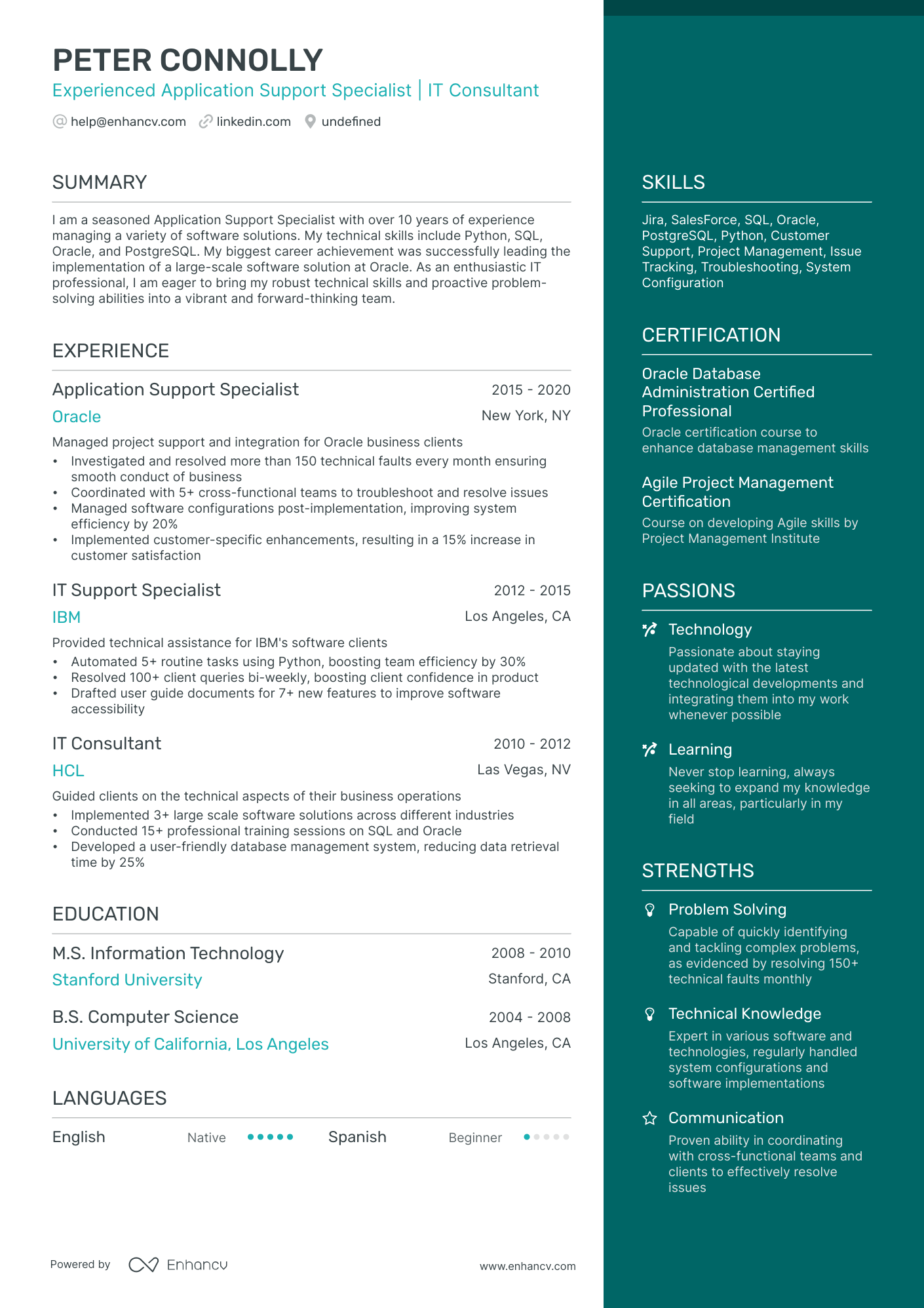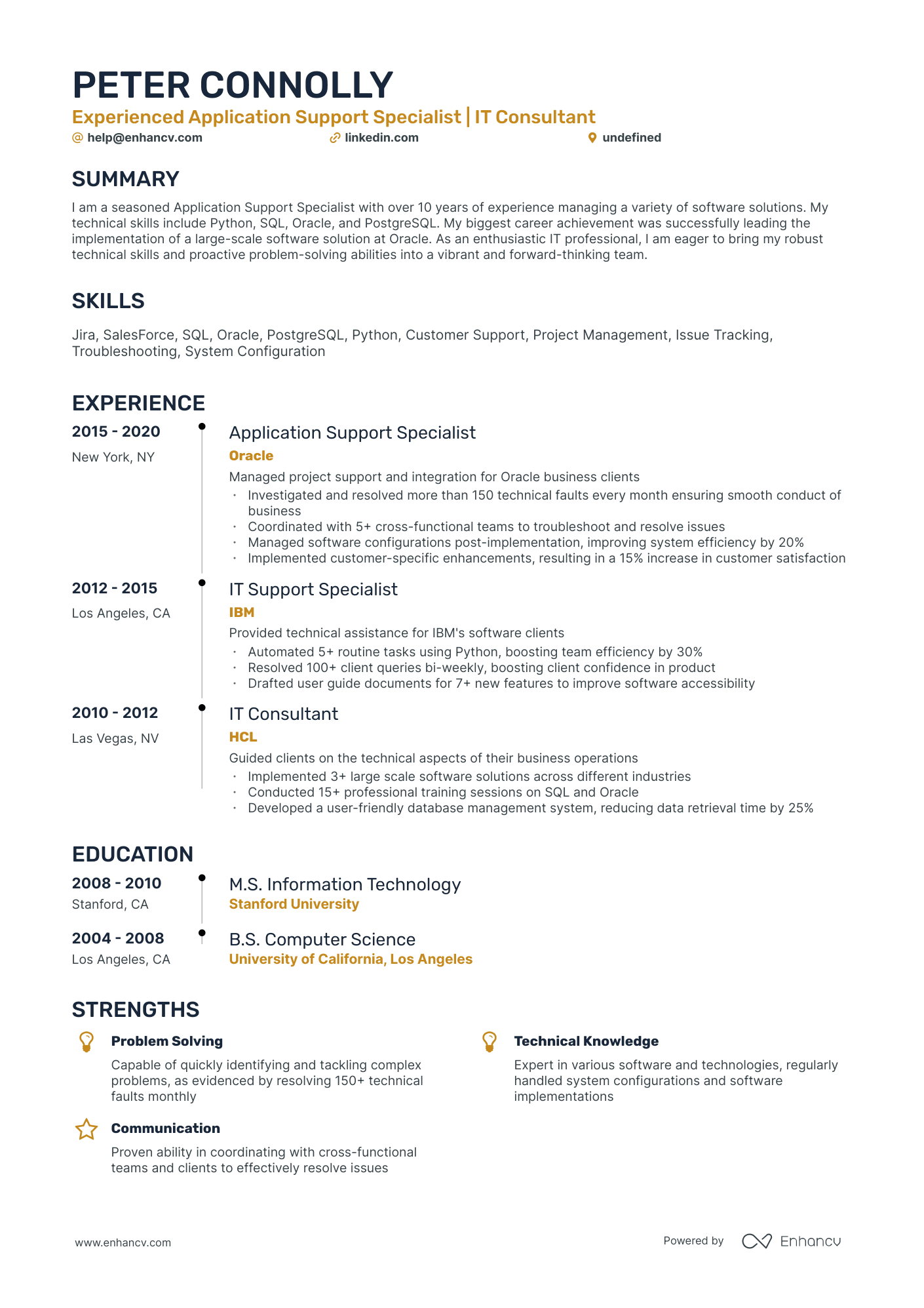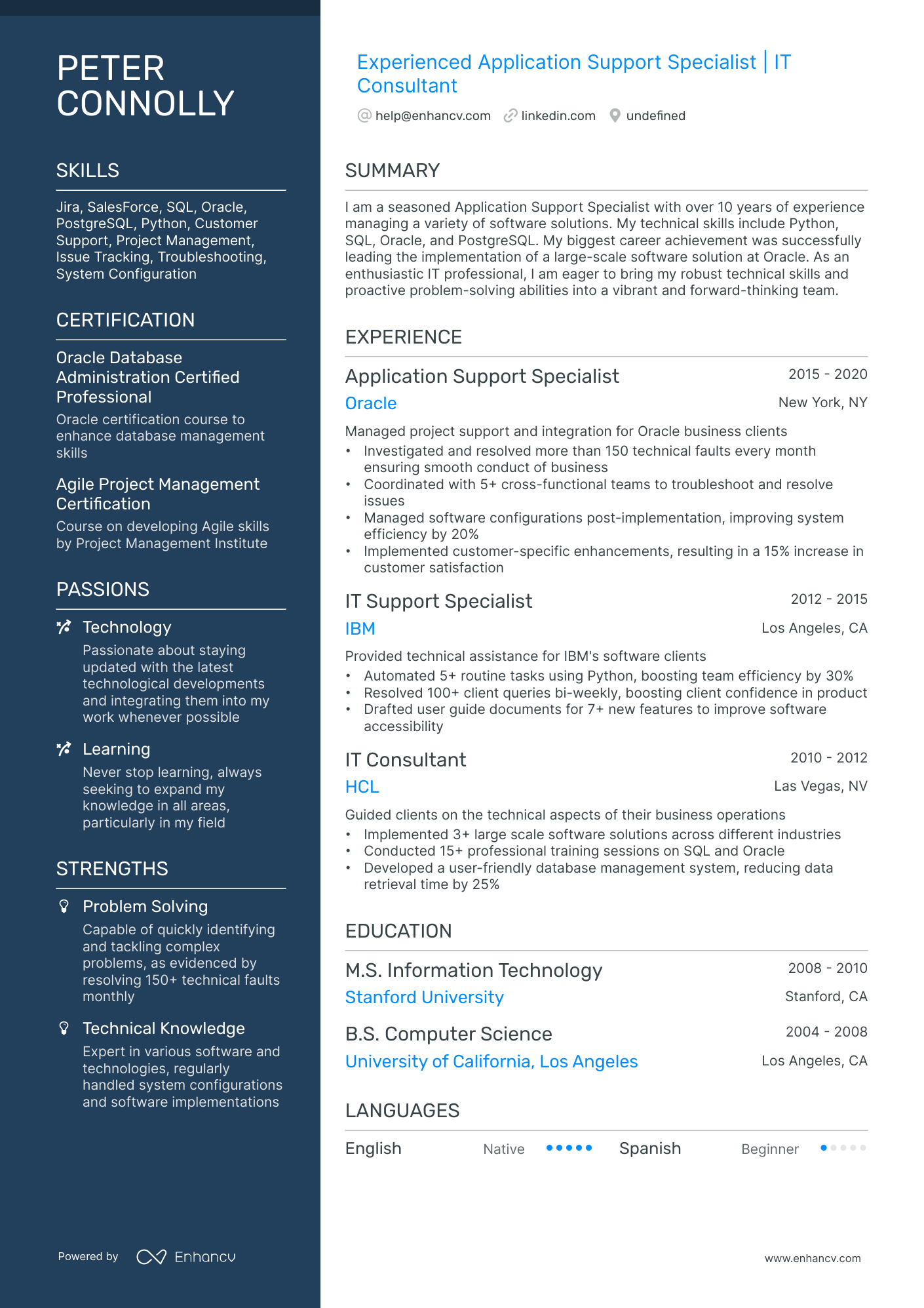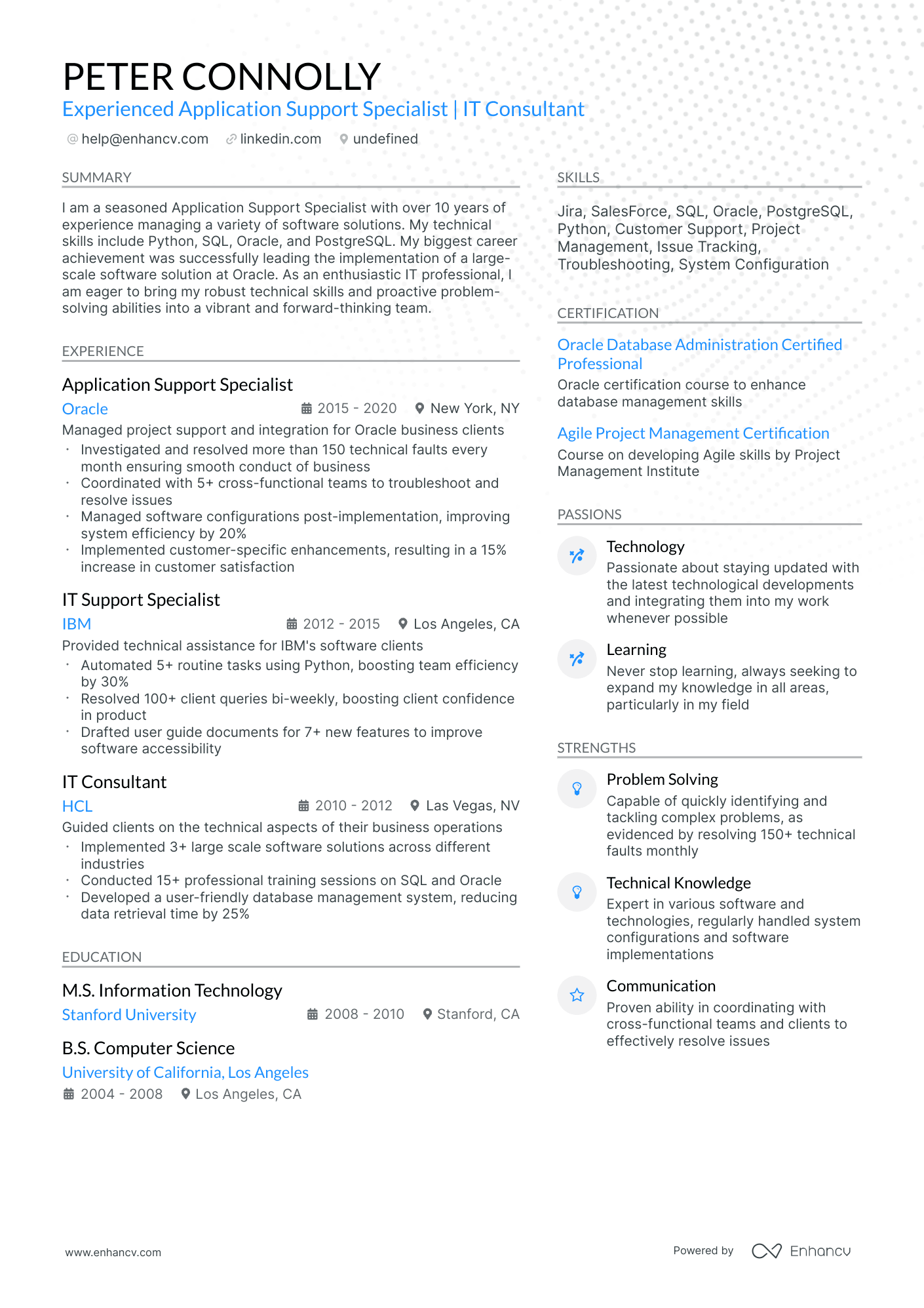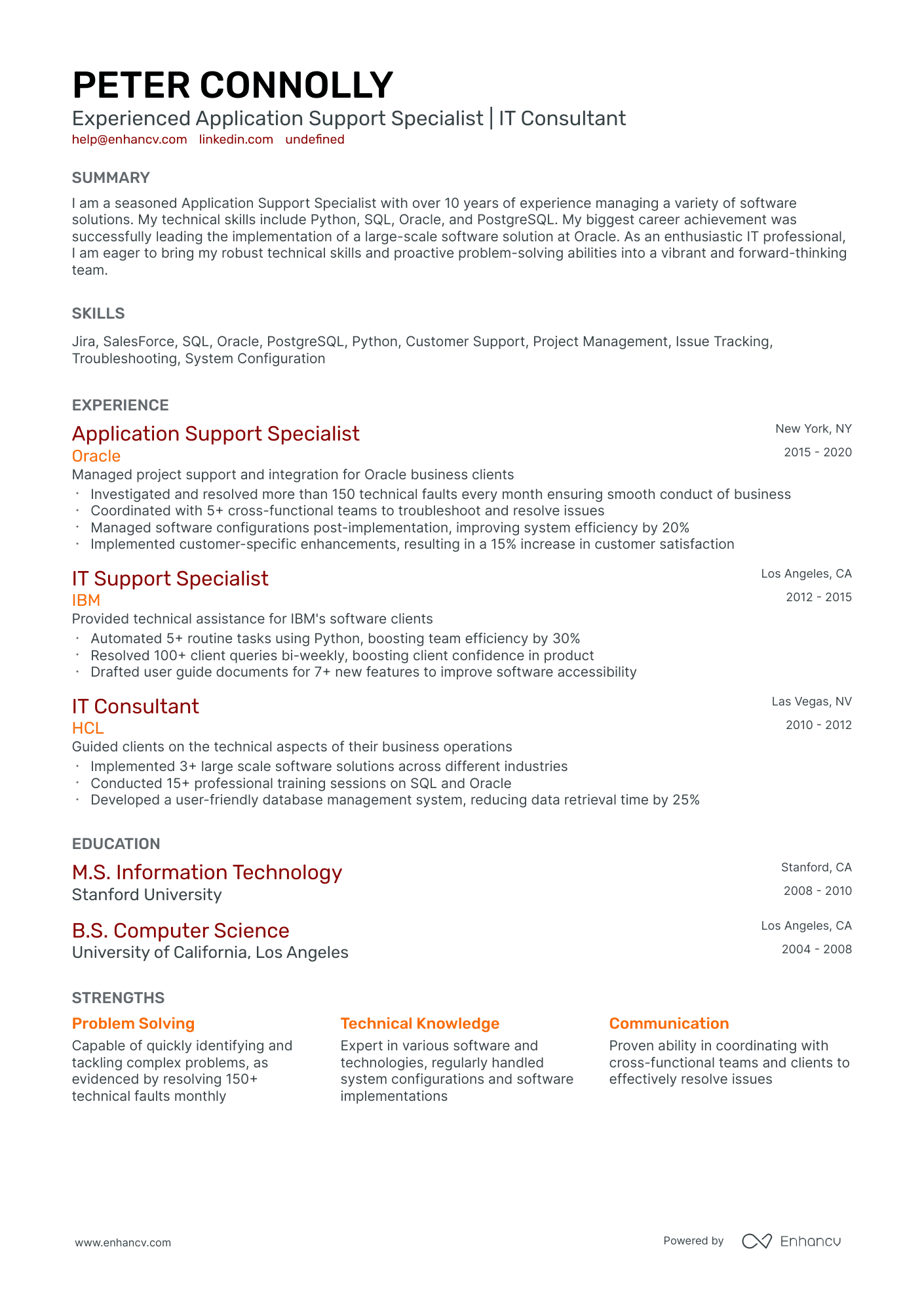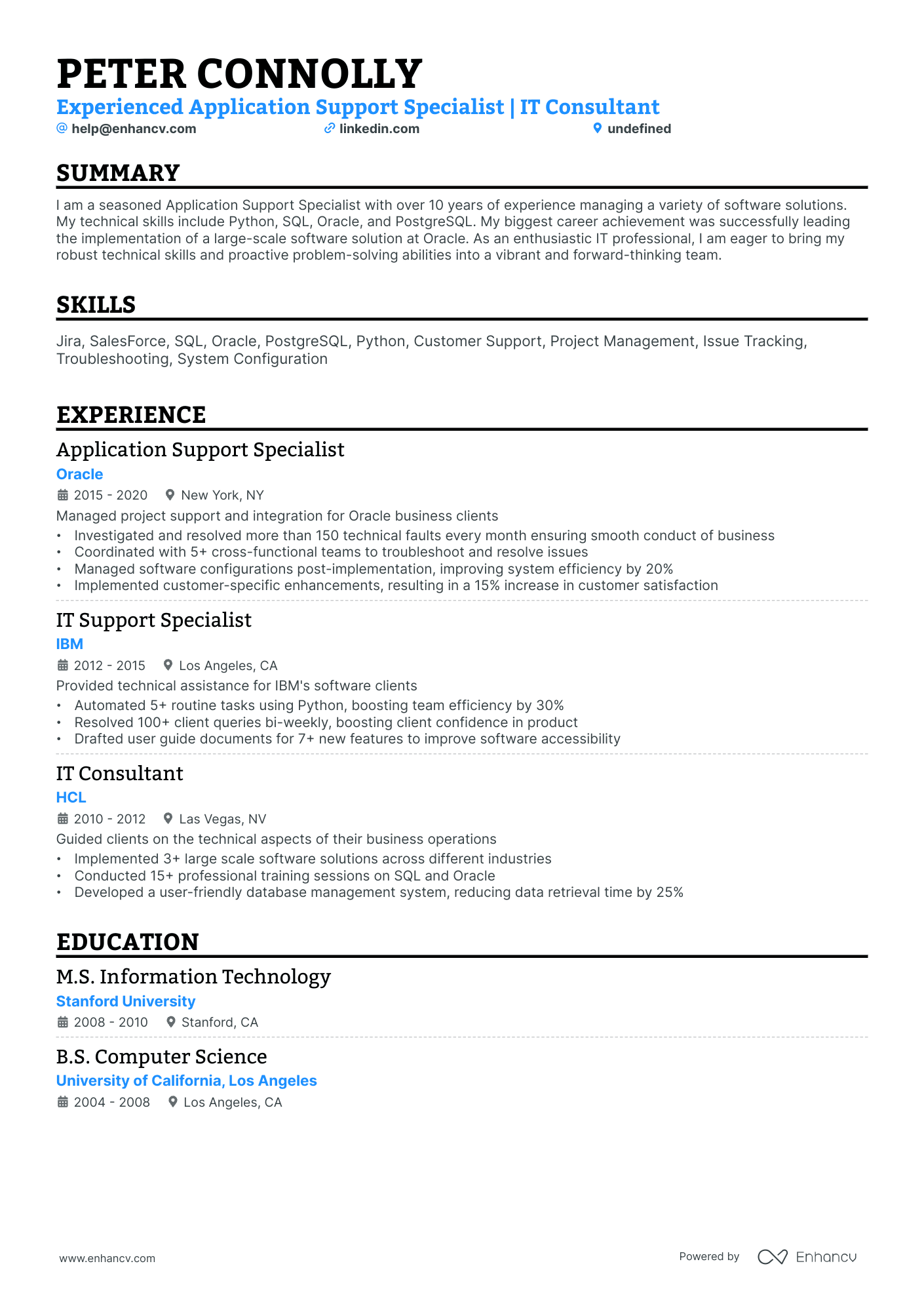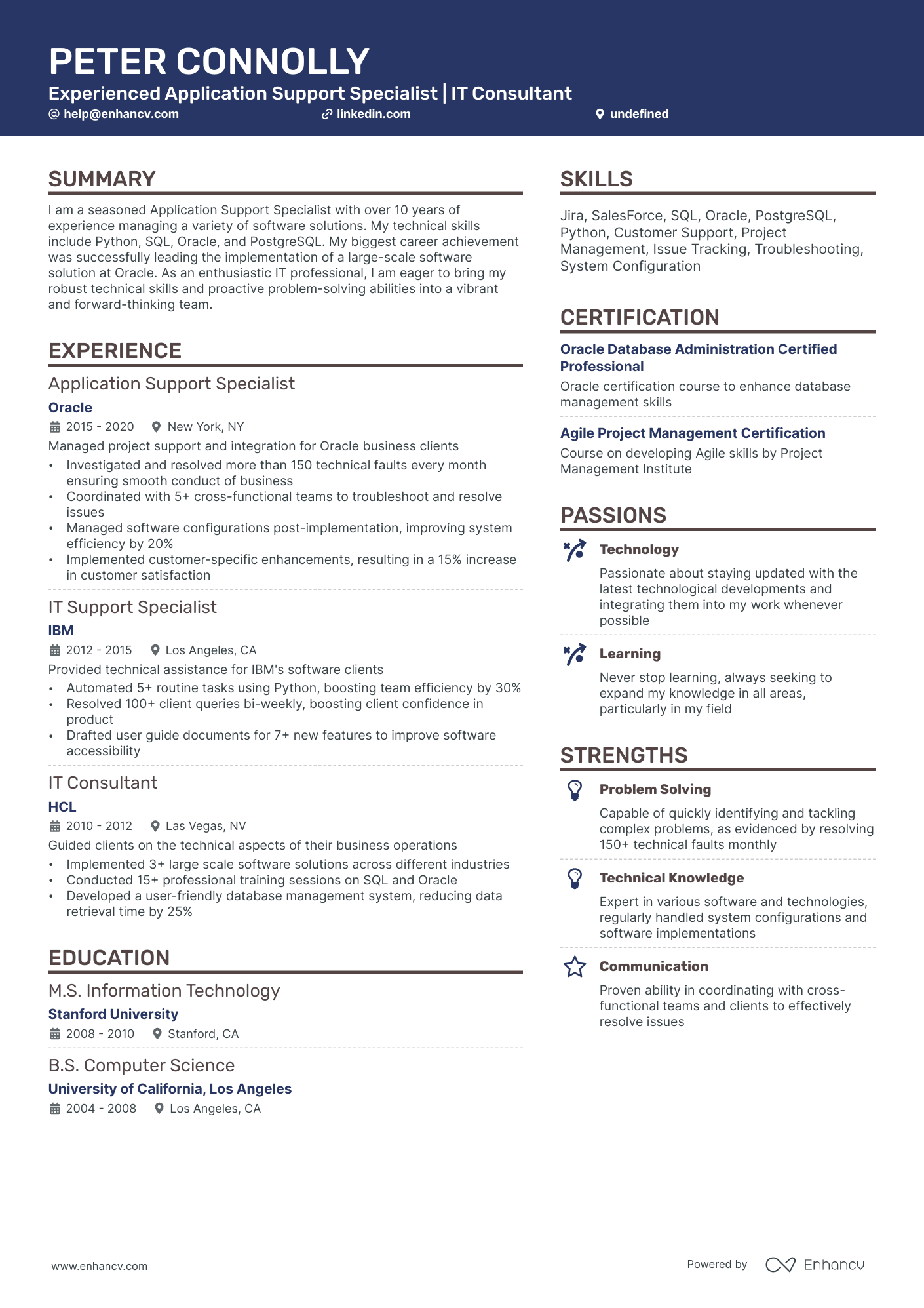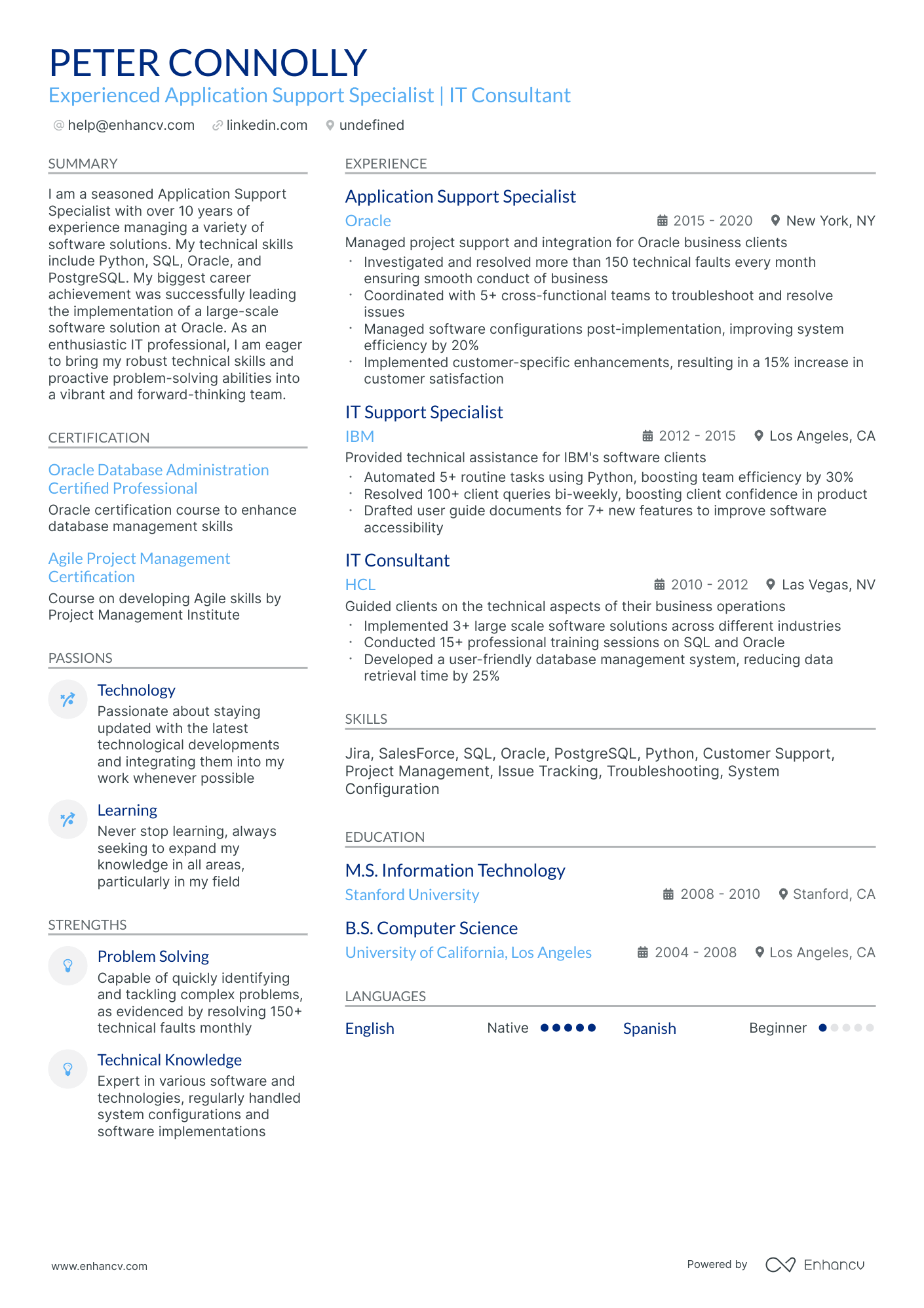Application support specialists often struggle with effectively showcasing their diverse range of technical skills and troubleshooting experience in a concise manner on their resumes. Our guide can assist by providing targeted examples and templates that demonstrate how to clearly highlight these skills, making it easier for recruiters to understand your expertise and potential value to their organization.
Dive into this guide to learn how to craft a application support specialist resume that offers recruiters a clear view of your career journey:
- Draw from our application support specialist resume samples, highlighting top skills, certifications, and more.
- Illuminate the potential impact you can bring to an organization through your resume summary and experience.
- Spotlight your unique application support specialist expertise, emphasizing tangible results and standout achievements.
Recommended reads:
Simple guide to your application support specialist resume format
Successful application support specialist resumes all have something in common - candidates invest in a simple resume layout . One that is easy to read, makes a good first impression, and is adapted to their professional experience.
There are three distinct resume formats , which help you focus on different aspects of your resume. Those are:
- A reverse-chronological resume format - puts your most recent experience in the spotlight
- A functional skill-based resume format that makes your transferrable skills the center of attention
- A hybrid resume format - it combines skills and experiences.
What's more, keep in mind that your resume usually goes through an ATS (Applicant Tracker System) (i.e. the software used by companies in the hiring process).
The application support specialist resumes that suit the ATS:
- incorporate exact match keywords and skills from the job description;
- should be no longer than two pages;
- should be submitted in a PDF format, unless specified otherwise.
Upload your resume
Drop your resume here or choose a file. PDF & DOCX only. Max 2MB file size.
Pro tip
If you don't happen to have that much relevant experience for the role, you could select a different format for your resume. Popular choices include:
- functional skill-based resume format - that puts the main focus on your skills and accomplishments;
- hybrid resume format - to get the best of both worlds with your application support specialist experience and skills.
Don't forget to include these six sections on your application support specialist resume:
- A header for your contact details and a summary that highlight your alignment with the application support specialist job you're applying for
- An experience section that explains how you apply your technical and personal skills to deliver successful results
- A skills section that further highlights how your profile matches the job requirements
- An education section that provides your academic background
- An achievements' section that mentions any career highlights that may be impressive, or that you might have missed so far in other resume sections
What recruiters want to see on your resume:
- Proven experience in troubleshooting and resolving application issues in a timely manner.
- Strong understanding of software, hardware, and network infrastructure.
- Demonstrated knowledge of the specific application/platform to be supported, along with relevant certifications if applicable.
- Excellent customer service skills, including clear communication and problem-solving abilities.
- Experience in handling incident management procedures and escalation processes.
Recommended reads:
Writing your application support specialist resume experience
Here are some quick tips on how to curate your application support specialist professional experience:
- Always ensure that you quantify your achievements by implementing the Situation-Task-Action-Result framework;
- When writing each experience bullet, make sure you're using active voice;
- Stand out by including personal skills you've grown while at the job;
- Be specific about your professional experience - it's not enough to say you have great communication skills, but rather explain what your communication track record led to?
Wondering how other professionals in the industry are presenting their job-winning experience? Check out how these application support specialist professionals put some of these best practices into action:
- Collaborated with cross-functional teams to provide application support for various software solutions.
- Resolved technical issues and inquiries from end-users, resulting in a 30% reduction in support tickets.
- Assisted in the implementation of a new CRM system, ensuring smooth transition and training for employees.
- Developed and conducted training sessions on application usage, empowering users to maximize productivity.
- Participated in testing activities and provided feedback to development teams for continuous improvement.
- Managed critical incidents and performed root cause analysis to identify and resolve application issues promptly.
- Enhanced monitoring processes, resulting in a 20% decrease in system downtime.
- Collaborated with developers to troubleshoot and debug complex code, ensuring optimal system performance.
- Contributed to the creation of comprehensive knowledge base articles, improving self-service support options.
- Coordinated with third-party vendors to escalate and resolve issues related to integrated systems.
- Provided Tier 2 application support, assisting help desk personnel in troubleshooting advanced technical issues.
- Implemented monitoring tools to proactively identify system anomalies, reducing response time by 25%.
- Led the migration of legacy applications to a cloud-based platform, resulting in improved scalability and cost-efficiency.
- Collaborated with developers to deploy application updates and patches, ensuring version control and stability.
- Developed and maintained comprehensive documentation on application configurations and processes.
- Assisted in the setup and configuration of new software applications for internal use.
- Investigated and resolved user-reported issues, providing timely and effective solutions.
- Conducted user acceptance testing for software enhancements and updates.
- Provided end-user training on core applications, improving overall system adoption.
- Contributed to the development and improvement of support policies and procedures.
- Collaborate closely with development teams to troubleshoot and resolve complex application issues.
- Implement proactive monitoring and alerting systems, reducing downtime by 15%.
- Lead the configuration and customization of CRM systems to meet specific business requirements.
- Provide training and ongoing support to end-users, resulting in increased user satisfaction.
- Contribute to the development and execution of project plans for system upgrades and enhancements.
- Managed a team of application support specialists, ensuring SLAs were met with high customer satisfaction.
- Designed and implemented an incident management process, reducing average resolution time by 20%.
- Collaborated with cross-functional teams to define and document standard operating procedures.
- Developed and delivered training programs for new hires, improving onboarding efficiency.
- Led the implementation of a knowledge management system, enabling self-service support for end-users.
- Provided application support for a diverse range of software products and systems.
- Identified and resolved complex technical issues, ensuring minimal impact on business operations.
- Collaborated with development teams to prioritize and implement bug fixes and enhancements.
- Assisted in the design and execution of user acceptance testing for system upgrades.
- Developed and maintained documentation on application configurations and troubleshooting procedures.
- Managed incident and service request queues, ensuring timely resolution within SLA targets.
- Investigated and diagnosed recurring application issues, implementing preventive measures.
- Coordinated with vendors to resolve software defects, tracking progress and ensuring timely resolutions.
- Developed and delivered training sessions on new features and functionality to end-users.
- Participated in the evaluation and selection of new applications and tools to enhance support capabilities.
- Provided technical support for enterprise-level applications, assisting end-users with issue resolution.
- Implemented proactive monitoring systems, resulting in a 25% decrease in critical system failures.
- Collaborated with development teams to test and deploy software updates and enhancements.
- Developed and maintained application-specific troubleshooting guides for the support team.
- Assisted in the development of custom reports and data queries for business analysis purposes.
- Provided front-line technical support for applications, resolving issues and escalating complex cases.
- Assisted in the creation and maintenance of knowledge base articles and user guides.
- Participated in testing activities for new software releases and patches.
- Collaborated with developers to reproduce and debug customer-reported issues.
- Conducted remote sessions to guide end-users through application installations and configurations.
Quantifying impact on your resume
<ul>
Navigating the resume landscape without experience
It's not uncommon for candidates lacking direct experience to secure entry-level positions. Their resumes often share these characteristics:
- They opt for a functional or skill-based format, emphasizing strengths over chronological work history.
- Transferrable skills, gleaned from diverse life and work experiences, take center stage.
- The objective section melds career highlights, the motivation behind the application, and the unique value proposition for the role.
- Skills are tailored to meet basic job prerequisites while also spotlighting any specialized expertise.
Recommended reads:
Pro tip
Use the SOAR (Situation - Action - Results) method for each of your application support specialist experience bullets. Reflect on specific challenges you've addressed, the actions you took, and the outcomes. This approach also preps you for potential interview questions.
Spotlighting your application support specialist hard and soft skills
Hard skills denote your technological proficiency and expertise in specific tools or software. These skills are often validated through certifications and hands-on experience.
Soft skills, on the other hand, reflect your interpersonal abilities and how you navigate workplace dynamics. These skills are cultivated over a lifetime and can be more nuanced.
Why the emphasis on both? Hard skills demonstrate your technical competence and reduce training needs. Soft skills suggest adaptability and cultural fit.
To optimize your skills section:
- Forego basic skills like "Excel" in favor of more specific proficiencies like "Excel Macros".
- Highlight core values and work ethics as soft skills, indicating what you prioritize in a professional setting.
- If relevant, create a distinct section for language proficiencies.
- Balance hard and soft skills by crafting a strengths or achievements section, illustrating outcomes achieved through both skill sets.
To assist you, we've curated a list of skills highly sought after by recruiters. Ensure you integrate those that resonate with your expertise and the prospective employer's needs:
Top skills for your application support specialist resume:
SQL
Java
Python
HTML/CSS
JavaScript
REST APIs
ServiceNow
JIRA
Linux
Microsoft SQL Server
Problem-solving
Communication
Teamwork
Time management
Attention to detail
Adaptability
Customer service
Analytical thinking
Conflict resolution
Critical thinking
Pro tip
If the job emphasizes team or organizational culture, dedicate a section of your resume to underscore your strengths and achievements. Top-tier application support specialist candidates also highlight their alignment with a company's values and culture.
Choosing the right certifications and education for your application support specialist resume
Your education section can highlight skills and experiences perfect for the job.
- List college or university degrees with the school name and dates.
- If you're still studying, mention your expected graduation date.
- Think twice before adding unrelated degrees. Space on your resume is precious.
- Discuss educational achievements if they boost your job relevance.
There are many certifications out there. Which ones should you include?
- List your main degree in a separate section with the school name and dates.
- Only add certifications that highlight your skills and experience.
- Place unique or recent certifications near the top.
- Add a brief description to certifications if it helps show your skills.
Remember, it's not about quantity but relevance.
Best certifications to list on your resume
- Microsoft Certified: Azure Administrator Associate (MCAAA) - Microsoft
- ITIL Foundation Certificate in IT Service Management (ITIL) - AXELOS
- AWS Certified SysOps Administrator – Associate (ACSOAA) - Amazon Web Services
- CompTIA A+ Certification - CompTIA
- Certified Information Systems Security Professional (CISSP) - (ISC)²
- Cisco Certified Network Associate (CCNA) - Cisco
- Professional Scrum Master I (PSM I) - Scrum.org
Pro tip
If you have plenty of certifications, prioritize the most relevant and industry-recognized ones. Arrange them based on their relevance to the job at hand.
Recommended reads:
Deciding between a application support specialist resume summary or objective
While some argue the resume summary or objective is outdated, these sections can effectively:
- Integrate pivotal application support specialist keywords.
- Showcase your achievements.
- Clarify your motivation for applying.
The distinction lies in their focus:
- A resume objective emphasizes your career aspirations.
- A resume summary spotlights your career milestones.
Opt for a summary if you have a rich experience you wish to highlight immediately. Conversely, an objective can be ideal for those wanting to underscore their aspirations and soft skills.
For inspiration, we've curated samples from industry professionals to guide your resume summary or objective crafting:
Resume summary and objective examples for a application support specialist resume
Result-driven application support specialist with a strong technical background and over 10 years' experience in the IT industry. Expertise includes troubleshooting, SQL, Java, and Agile project management. Recognized for streamlining processes to improve productivity by 20% at XYZ Corporation.
Detail-oriented professional with 15+ years of experience as an IT consultant, seeking to leverage my expertise in systems analysis, debugging, and problem-solving in the capacity of an application support specialist. Proven record of improving system performance and efficiency at ABC Enterprises.
Certified public accountant with more than 8 years of experience managing financial systems, looking to transition to application support. Proficient in SQL, Python, and cloud applications, with a demonstrated ability to learn new technologies rapidly. Successfully implemented a major software upgrade for my previous employer.
A mechanical engineer with a passion for technology, aiming to pivot into application support. Holds a certificate in IT Support from XYZ University and has hands-on experience with Java, C++, and SQL. Previously developed an automated testing system that increased operational efficiency by 15%.
Eager computer science graduate seeking to apply theoretical knowledge and internship experience in real-world settings as an application support specialist. Looking forward to contributing to enhancing system functionality and end-user satisfaction at a fast-paced tech-driven organization.
Motivated Information Technology student with a focus on software development, hoping to start a career as an application support specialist. Enthusiastic about using my problem-solving skills and understanding of C#, Java, and cloud computing to ensure smooth software operations and user satisfaction.
Extra sections to boost your application support specialist resume
Add more sections to show off your unique skills and personality.
- Projects - Include any impressive ones you've done outside of work.
- Awards - Show off any industry recognition.
- Volunteering - Share causes you care about and skills you've gained.
- Personality - Hobbies or favorite books can give a glimpse into who you are.
Key takeaways
- Pay special attention to the tiny details that make up your application support specialist resume formatting: the more tailored your application to the role is, the better your chances at success would be;
- Select the sections you include (summary or objective, etc.) and formatting (reverse-chronological, hybrid, etc.) based on your experience level;
- Select experience items and, consequently, achievements that showcase you in the best light and are relevant to the job;
- Your profile will be assessed both based on your technical capabilities and personality skills - curate those through your resume;
- Certifications and education showcase your dedication to the particular industry.
